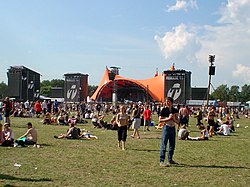Roskilde Festival: Difference between revisions
No edit summary |
No edit summary |
||
| Line 9: | Line 9: | ||
}} |
}} |
||
'''Roskilde Festival''' is one of the two biggest annual [[Music festival|rock music festivals]] in [[Europe]] (the other being the [[Glastonbury festival]]) |
'''Roskilde Festival''' is held south of [[Roskilde]], [[Denmark]] and one of the two biggest annual [[Music festival|rock music festivals]] in [[Europe]] (the other being the [[Glastonbury festival]]). It was created in [[1971]] by two high school students, Mogens Sandfær and Jesper Switzer Møller, and promoter Carl Fischer. In [[1973]], the festival was taken over by the Roskilde Foundation, who has since run the festival as a non-profit organisation for development and support of music, culture, and humanism. |
||
It being Denmark's first real music oriented festival, originally for hippies but today covering more of the mainstream youth from [[Scandinavia]] and the rest of Europe. Roskilde Festival 2003 gathered more than 65,000 paying people for the concerts, along with 20,000 workers, most of them volunteers. |
It being Denmark's first real music oriented festival, originally for hippies but today covering more of the mainstream youth from [[Scandinavia]] and the rest of Europe. Roskilde Festival 2003 gathered more than 65,000 paying people for the concerts, along with 20,000 workers, most of them volunteers. |
||
Revision as of 19:24, 12 June 2006
| Roskilde Festival | |
|---|---|
 | |
| Genre | Alternative rock, Pop, Hip Hop, Metal, World music |
| Dates | Four days, starting from last Thursday in June |
| Location(s) | Roskilde, Denmark |
| Years active | 1971 - present |
Roskilde Festival is held south of Roskilde, Denmark and one of the two biggest annual rock music festivals in Europe (the other being the Glastonbury festival). It was created in 1971 by two high school students, Mogens Sandfær and Jesper Switzer Møller, and promoter Carl Fischer. In 1973, the festival was taken over by the Roskilde Foundation, who has since run the festival as a non-profit organisation for development and support of music, culture, and humanism.
It being Denmark's first real music oriented festival, originally for hippies but today covering more of the mainstream youth from Scandinavia and the rest of Europe. Roskilde Festival 2003 gathered more than 65,000 paying people for the concerts, along with 20,000 workers, most of them volunteers.
Traditionally the campsite opens the last Sunday of June, which gives the festivalguests plenty of times to settle down and "warm up". The festival officially starts the following Thursday at the Animal Showgrounds (in recent years simply known as the "Festival Site") and lasts for 4 days.

The tents are called 'stages', which were until 2003 named after their colour, but as the names had not matched the actual colour of the tents for a period, it was decided to rename all stages except the Orange Stage, the central and main stage. The Orange Stage is open in front of a huge field, whereas the other tents cover the whole audience, the largest of which is the Arena stage (formerly known as Green Stage), the largest tent in Europe with an official capacity of 18.000 people.
The music covers such styles as Heavy metal, HipHop, Electronic and Rock, but the festival wants to promote new artists and has setup a special stage for alternative music. It has also become a tradition to let an up and coming Danish band open the Orange Stage on the first day of the festival. There's always a stage for world music, not too big, but strategically located, so that people passing by will stop and learn something new. And there's usually at least one performance of classical music, often a full orchestra playing (parts of) well-known compositions.
Apart from music there is always some theatre and 'lone acts' wandering around the festival site. Terrain and tents are always decorated in various ways.
Until the mid-1990's the festival attracted mostly Scandinavians, but in recent years it has become more and more international (with an especially large influx of Germans). A Scandinavian alternative remained in the Midtfyns Festival, until that closed in 2004 following declining ticket sales.
Tragedy struck the festival in the year 2000 when nine people were killed. They were trampled to death in the crowd in front of the main stage during the Pearl Jam performance. As a result, massive security measures were installed for the festival in 2001. After the tragedy, a memorial site was set up close to the main stage. It features 9 trees and a stone inscribed with the words "How fragile we are".
Specific years
2005
The 2005 edition featured artists such as Audioslave, Autechre, Snoop Dogg, Black Sabbath, D-A-D, Duran Duran, Foo Fighters, Green Day, Brian Wilson, Fantômas, Kent and more than 160 other bands and DJs.
2006
Template:Future On January 25, the first three bands that will be performing at the 2006 Roskilde Festival were announced. They are Franz Ferdinand, Kanye West and Tool. After this, several other bands and artists, including Placebo, Morrissey, Guns N' Roses, Sigur Rós, Bob Dylan and Roger Waters, has been added to the list. For a complete list, see the Festival website's band list.
External links
- Official Website of the Roskilde Festival
- Roskilde Festival pictures from 2004
- Roskilde Festival pictures from 2005
- Roskilde Festival Flickr group
